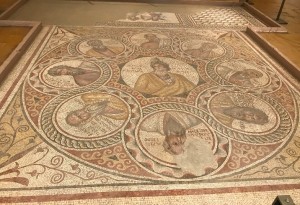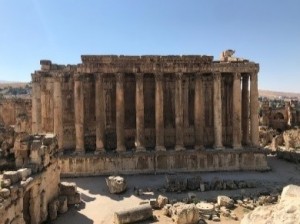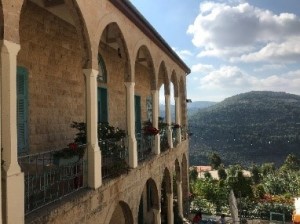Stunning Roman ruins, gorgeous Greek architecture, fabulous food and wine – all packed into a country that’s just half the size of Wales. Bristol Business News travel editor Anne Gorringe falls in love with the Lebanon, a Middle Eastern gem that’s as welcoming and warm as the climate…. 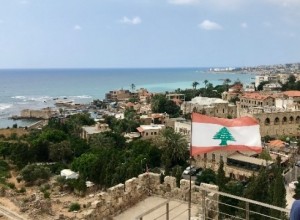
Robert Redford and Brad Pitt dash down a street, dodging their way past snipers and stray bullets as they head for the safe haven of Beirut’s Le Commodore Hotel.
Right: The old town of Byblos with its Crusader castle ruins, fishermen’s harbour and souks
It’s a scene from the 2001 film The Spy Game and I find it running through my mind as my plane touches down in Beirut.
Depicting the most difficult period in the city’s life – at the height of the Lebanese civil war in the 1980s – the movie shows a time when Le Commodore was a renowned base for war reporters.
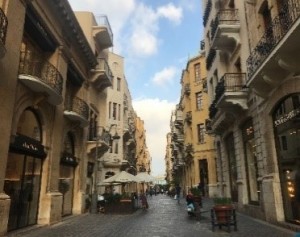 I’m excited. The famous hotel is the first stop on my week’s tour of the Lebanon with holiday experts Explore.
I’m excited. The famous hotel is the first stop on my week’s tour of the Lebanon with holiday experts Explore.
Left: The French influence in the architecture of this new, European-style shopping area
The company has only just reinstated its guided trips to this fascinating country after an eight-year break and, not surprisingly, it’s proving a popular destination.
I’m lucky to get a place on my trip and, together with my fellow travellers, am warmly greeted at the airport by Explore’s local guide Daniel.
Over the following days I’ll learn about his childhood growing up near the ‘green line’ in Beirut – the demarcation route that, during the war, separated the mainly Muslim factions in the western part of the city from the predominantly Christian east. 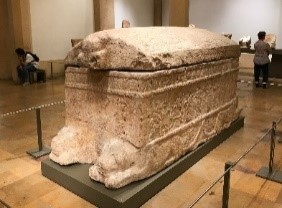
But first, Daniel’s impressive historical knowledge has me entranced as we travel towards Le Commodore, with promises of numerous highlights, including a tour of Beirut’s impressive National Museum.
Right: An ancient sarcophagus, complete with Phoenician script, in Beirut’s National Museum
The museum proves one of the highlights of the trip, starting with a mesmerising – and moving – 15-minute video depicting the efforts the staff went to to protect the artefacts during the civil war. Items on display here include sarcophagi from the Phoenician period and ornate, restored mosaics originally found in buildings in the Roman city of Baalbek.
A UNESCO world heritage site near the Syrian border, Baalbek will be the most easterly point on our trip.
Left: A tiled mosaic discovered in Baalbek and now in the National Museum
Having marvelled at the beautiful tiles in the museum – I was looking forward to seeing the actual temples where the mosaics originated.
Travelling there would take us over the Chouf Mountains to the Bekaa Valley for a wine-tasting tour and overnight stay in a hillside monastery. Then, after spending the night in Baalbek, we would explore the Roman site before turning back, heading west to the coastal city of Byblos. Occupied since the fifth millennium BC, Byblos boasts a Crusader castle and pretty fishermen’s harbour and is believed to be among the oldest continuously occupied cities in the world. 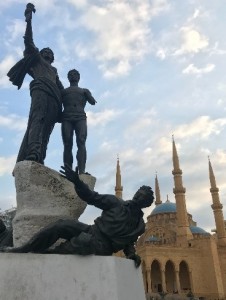
But I’m getting ahead of myself. Back in Beirut we are only just pulling up outside our hotel as Daniel warns us about the one real danger for travellers in the city today – the frenetic traffic! Carefully, he guides us across the road to the entrance of Le Commodore.
Right: Martyr’s Square in Beirut. Nationalists were executed here under the last years of Ottoman rule in 1916
Since the Lebanese War ended in a complex peace process in 1990, all government posts have been carefully divided up to ensure proportional representation from the different factions. With no one group holding the majority, getting new legislation passed is difficult. In reality, explains Daniel, this lack of decision-making has resulted in a lack of regeneration in certain areas – including the public transport system.
So, effectively, everyone is forced to buy their own car, with the resulting traffic chaos. The frustration has led to the locals’ dissatisfaction with the coalition government and the recent resignation of the prime minister.
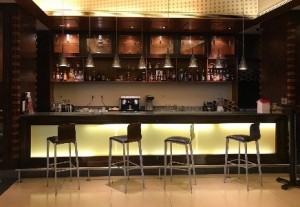 Le Commodore, of course, is no stranger to change having been built in the Hamra district in the heart of the city back in 1957.
Le Commodore, of course, is no stranger to change having been built in the Hamra district in the heart of the city back in 1957.
Left: The bar at Le Commodore
It has a five-star rating following a recent upgrade and my room is both comfortable and smart, with welcoming air conditioning – although it’s possibly more in line with a four-star rating in European standards.
I’m delighted to discover, however, that both the hotel bar and swimming pool remain just as they were during the 1975-1990 conflict. Thrilled to be following in the footsteps of world-famous war reporters, I enjoy a beer at the bar where I chat with hotel manager Jean-Marc Panossian before settling down for my first night in Beirut.
Jean-Marc tells me that back in the 1980s Le Commodore was known not just as a meeting place for the world’s press but also their informants – the local spies. 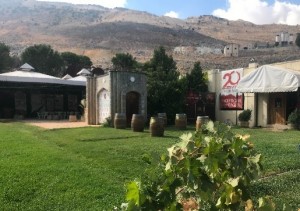
He has worked at other hotels across the region but he loves Beirut, and the excellent local wines produced here are just one reason.
Right: The Chateau St Thomas in the Bekaa Valley
“Lebanon is very interesting historically. And the people are warm and generous,” he says, admitting that despite the country going through very difficult times since the mid-seventies, the people have maintained their tradition of hospitality to all.
And, as we watch traffic outside he laughs: “Anarchy is a way of life here. But it’s warm chaos and … in the end, it works!”
However, there are still some reminders in Beirut of the devastation left behind by the war. The bombed-out remains of the famous Hilton Hotel, which back in 1975 was the highest building in the city, was used as a vantage point by snipers from all factions. Hopefully, this ghostly shell of a building is enough of a reminder to prevent the same thing happening again.
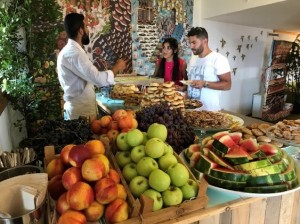 Lebanon remains both complicated and fascinating. With a long tradition of tolerance, this tiny country is home to 12 different Christian denominations plus five individual Muslim sects.
Lebanon remains both complicated and fascinating. With a long tradition of tolerance, this tiny country is home to 12 different Christian denominations plus five individual Muslim sects.
Left: The fabulous restaurant in the Tawlet Ammiq Community
A week in Lebanon certainly isn’t long enough to really understand the political situation. But my tour brings a new delight each day, discovering one architectural gem after another as I travel around this interesting country.
Moving eastwards – and inland – from Beirut, the countryside ranges from barren mountain slopes to the lush, green valleys and vineyards of the Bekaa Valley, plus the odd tree-lined peak graced with the famous Lebanese cedar trees featured on the country’s flag.
It was in the Bekaa Valley that I had my favourite meal of the week. At the countryside Tawlet Ammiq Community restaurant – where food is cooked and served by local families – we enjoyed a stunning view, eating at tables looking out across the valley.
There were around 14 dishes to sample, from spectacular classic Lebanese salads, including Tabbouleh, through to lamb stew and fresh fish.
And it was during my wine-tasting tour at Chateau St Thomas that I discovered Lebanese hospitality at first hand.
Right: The well-preserved Temple of Bacchus in Baalbek. The site is one the largest Roman ruins in the world
Our sommelier Natalie, one of the chateau’s joint owners, overheard that I would be celebrating my birthday the following day. As we came to leave she handed me a surprise present, a bottle of their most expensive red wine – a thoughtful and kind gesture. I was genuinely touched.
I gratefully took it with me as we travelled further east towards the Syrian border, where we would reach Baalbek, now a predominantly Muslim area.
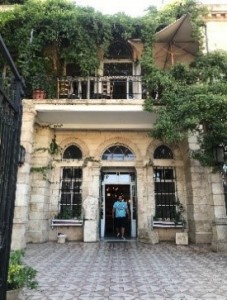 Here we were to stay at another renowned hotel, The Palmyra, which is – quite literally – across the road from the stunning ancient Greek and Roman city complex.
Here we were to stay at another renowned hotel, The Palmyra, which is – quite literally – across the road from the stunning ancient Greek and Roman city complex.
Left: The renowned Palmyra Hotel in the predominantly Muslim city of Baalbek
The Roman temples here have also been used each July since the 1950s as the impressive backdrop for a popular music festival.
And among the famous guests to have stayed at The Palmyra, with its old-world charm, are singer Nina Simone and former French president Charles de Gaulle.
However, one thing I hadn’t expected on our arrival in Baalbek was to find a tank parked outside the hotel’s front gates. Fortunately it was there on special peace-keeping duties during an annual – and particularly significant – 10-day religious festival.
I admit that having to manoeuvre my suitcase past a tank to reach The Palmyra’s entrance did feel very strange – yet Daniel was able to reassure us that, while Westerners might find the army’s presence at a festival surprising, locals are comforted by it. It’s just a way of life here.
It’s an exciting time to visit the Lebanon and Explore rigorously follows all government guidelines as well as ensuring all their guides have extensive local knowledge. Daniel’s tips on local customs and history proved both invaluable and helpful, and certainly added to the pleasure of the trip.
And while it’s true that some holidaymakers who venture to the Lebanon opt to travel independently, booking taxi trips to visit the sites, etc – it’s not something I personally would recommend.
Right: The Deir al Oumara in Chouf. This beautiful hotel was one of our overnight stops on the way to the Bekaa Valley
Having Daniel on hand to explain everything not only made my trip easier, it added to the experience.
Since 2011 the war in adjoining Syria has had an impact on tourism in Lebanon. But the country remains the safest to travel to in the Middle East and Explore’s decision to return ties in with the latest British government advice.
Baalbek itself is a predominantly Shia Muslim area and, while Daniel is himself Christian, his colleague and our minibus driver was Shia.
Not surprisingly hotel owner Rima Husseini, who met us for a drink at dinner, is also a Shia Muslim.
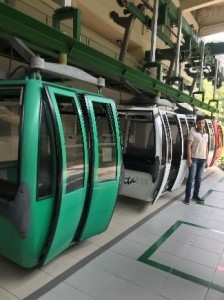 Rima, who is a trained lawyer and lecturer, is married to Ali, who took over the hotel in the middle of the war in 1985.
Rima, who is a trained lawyer and lecturer, is married to Ali, who took over the hotel in the middle of the war in 1985.
Left: All aboard – the cable cars at the Jeita Caves
She tells us that a liberal and tolerant attitude has always been part of the country’s heritage. However, she is concerned that many of the rights that people take for granted are not actually written down in the constitution.
Rima, who lost her father in the war when he was killed by a sniper when she was 15, is concerned that people are starting to become more conservative in their attitudes.
Lebanon has, traditionally, been one of the few – if not the only – Middle East country with freedom of the press and where, as she says, “you can speak your mind”.
“Complacency is leading to people sleepwalking into losing something very special. The liberal attitude for tolerance has always been part of this country’s heritage,” she says.
Our week ends back on Lebanon’s west coast, with a relaxing stay at a beachside hotel in Byblos. Here I’m surprised by the European feel of this resort with its Crusader castle, great seafood and souks.
The traditional market here is in complete contrast to Beirut’s ultra-modern shopping complex. While these Western-style shopping streets are also referred to as ‘souks’, they are much more like smart British malls.
There’s one final surprise on the last day of my tour while on the way to the airport – a visit to the Jeita Caves. The upper section is reached by a spectacular cable car and, once inside the grotto, there is a 750-metre pathway for visitors to walk beneath giant stalactites. The lower part involves a boat ride on the water inside the bottom caves.
A perfect way to end the week before heading back to the airport for our journey home.
DON’T MISS: A trip to the newly restored National Museum. http://www.beirutnationalmuseum.com/
STAY IN BEIRUT: The five-star hotel Le Commodore Hotel is an ideal base for business, shopping and entertainment while the Corniche seafront promenade and American University of Beirut are just a 15-minute stroll away. http://www.lecommodorehotel.com/
FACT FILE: Explore’s Highlights of Lebanon tour were fully booked in December but departures on the 2020 tours begin again on February 15 onwards and throughout the year. Prices for the eight-day trip start from £1,599, including flights, accommodation, some meals, local guides and an Explore leader. For more information tel: 01252 883629 or visit www.explore.co.uk
FOREIGN OFFICE ADVICE: The Lebanon remains the safest country to travel to in the Middle East. Explore follows the latest government guidelines. To check the latest information for yourself visit https://www.gov.uk/foreign-travel-advice/lebanon
















